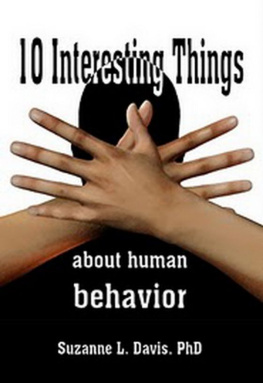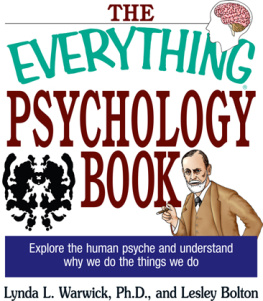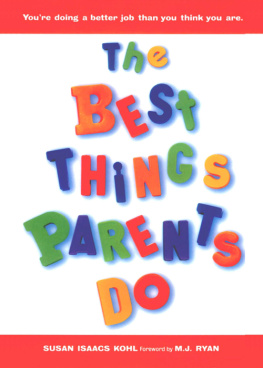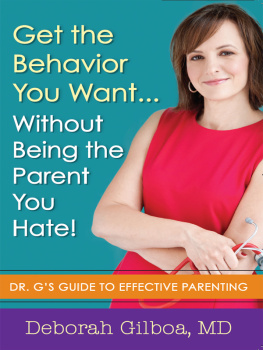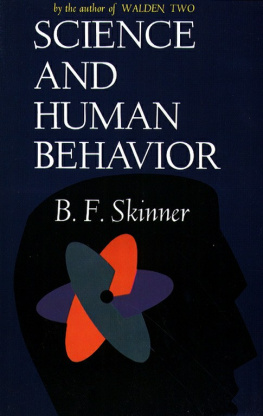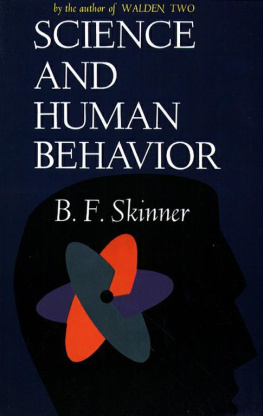Ten Interesting Things About HumanBehavior
By Suzanne L. Davis, Ph.D.
2nd Edition
Copyright Suzanne L. Davis/Mindgame 2012
Smashwords Edition
Cover Art by Katrina Joyner
Smashwords Edition License Notes
Thank you for downloading this free eBook. You arewelcome to share it with your friends. This book may be reproduced,copied and distributed for non-commercial purposes, provided thebook remains in its complete original form. If you enjoyed thisbook, please return to Smashwords.com to discover other works bythis author. Thank you for your support.
Table ofContents
You can change your attitudes bychanging your behavior.
Human beings can be inconsistent. Andthats perfectly normal.
Most public debates about the causesof behavior get it wrong.
Reading the subtleties of bodylanguage tells you little, if anything, about a person.
Tabloids and reality shows can makeus feel better about ourselves.
Rewards andpunishment work wonders, but you have to work it.
Dont put your average Joe on thespot and expect a good outcome.
We use a double-standard when wejudge ourselves relative to others.
Airline travel brings out weird, andoften downright rude, behavior.
Our brains turn off our behaviorwhen we dream.
Forward
I think most of us are interested in why wedo the things we do. Why do we change our minds? Why do violentvideo games make some children act aggressively but have littleeffect on others? Why are reality TV shows, some of which portraycontestants as pathetic and dysfunctional, so popular?
Psychological science has answered these andmany other questions about human behavior. Notice the termpsychological science. I use this term because there is somuch more to the field than what typically comes to mind when thetopic of psychology comes up. Research psychologists spend theircareers developing and testing theories about human (and animal)behavior. Its not a guessing game, its not aboutopinions, and its not about excusing bad behavior. It isaboutexplaining behavior using the methods ofscience.
What is unfortunate is that the findings frompsychological research live in academic journals and collegetextbooks, but they are rarely seen by the public. Id like tochange that, and this book is a start. What you will find in thisbook are ten observations about human behavior that are supportedby psychological science, and heres the fun part: I apply thefindings to things we experience every day.
I want to say a special thanks to those ofyou who offered constructive feedback on the first edition of 10Things. There have been no substantive changes to this2nd Edition, but I have clarified a few points inresponse to reader suggestions and updated my contactinformation.
I hope you enjoy the book!
Number 1:
You can change your attitudes
by changing your behavior.
When I was teaching and presented thisprinciple for the first time, I got a lot of blank stares. Thencame the questions...
Shouldnt that be the other way around?Dont my attitudes influence how I act?
Thats ridiculous! I have a strong valuesystem and I always live by it!
Are you saying that people are fickle andcant control their feelings?
No, it doesnt mean we are fickle, nor doesit mean attitudes never have an effect on behavior. Of course ourattitudes affect our behavior. But it is also true that ourbehavior can have a direct effect on our attitudes under the rightcircumstances (Eagly & Chaiken, 1993).
Heres how it works. I used to live inChicago, where it was illegal to carry a concealed weapon. Nobody Iknew owned a gun, and most thought that guns equaled crime and thefewer guns in the streets, the better. When I moved to Houston, Ilearned that most Texans had very different feelings toward guns,associating them with personal safety, defense of the home, andsport (e.g., target practice, hunting). The first time I visited mynext-door neighbors, I was introduced to their gun collection,which was displayed in a quite impressive gun cabinet.
I was puzzled. I couldnt reconcile the factthat my neighbors and many other good upstanding citizens owned andenjoyed guns. I was in conflict over what I came to Houstonbelieving (guns equal crime) and how I was behaving(interacting with nice gun owners). Over time, I became morecomfortable with the idea of citizens being able to carry guns.My attitudes about guns changed to be consistent with mybehavior.
If youve ever been on a diet, you may seeyourself in this next example, which Im borrowing from Baron,Byrne, and Johnson (1998). Suppose you commit to a diet thatoutlaws desserts. You adopt the belief that sugar is the enemy andshould be avoided. After a while, you slip and eat a pint ofchocolate-chocolate-chip Haagen Dazs (the best flavor in myopinion). Now you have a problem. You feel guilty. Yourbehavior (the slip) is at odds with your beliefs(sugar is the enemy).
The psychological discomfort you feel (whichis guilt in this example) is known to psychologists as cognitivedissonance, or a state of tension between what you did and whatyou believe (Aronson, 1969; Festinger, 1957; Harmon-Jones &Mills, 1999). How do you relieve your guilt? One way is to reviseyour attitude. Oh well, I guess its ok to have an occasionaltreat even though Im on a strict diet.Your behaviorcaused a change in your attitude.
What good is knowing this?
Well, now that you know the power ofcognitive dissonance, why not capitalize on it? Perhaps you haveheard these adages: Do the right thing and your brain willfollow, or Act like the person you want to be and you justmight become that person. Both statements refer to the amazingthing our brains do when our behavior and attitudes dont match.You can learn to like something (or at least become morecomfortable with it) by just doing it and continuing to do it,even if you initially dont want to.
If you are a parent, you may be able tochange your childrens attitudes for the better. If you gently, um,force them to get into the habit of doing things they initiallydislike (like taking out the garbage), theres a good chance thattheir feelings about it will become more positive over time. Theyjust might come to believe that garbage duty is not so bad.
Number 2:
Human beings can be inconsistent.
And thats perfectly normal.
Scenario: Debate class. Debater 1 isarguing pro-life, and Debater 2 is arguing pro-choice.
Debater 1: Abortion is murder.
Debater 2: No, murder means killing aperson. A baby isnt a person until birth.
Debater 1: No, life begins atconception, so abortion is murder.
Debater 2: Well, then you must beagainst all abortions.
Debater 1: No, I believe abortionsshould be allowed in cases of rape, or if the mothers life is indanger.
Debater 2: But you said life begins atconception, and abortion is murder. That means by your own accountthat you support murder under certain conditions.
Debater 1: Absolutely not. I wouldnever support murder.
Debater 2: You cant have it bothways. Your beliefs are inconsistent.
Debater 1: Lets look at your beliefs,then. Do you support capital punishment?
Debater 2: No. I think that kind ofpunishment is not for people to decide.
Debater 1: So let me get thisstraight. You think it is ok to murder a child in the womb, butits not ok to kill a serial killer?
Debater 2: Thats not what I said. Idenounce murder in any form, but abortion is not murder.

